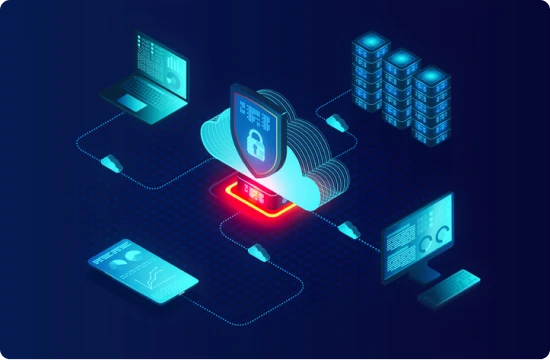Why EDR Security is Essential for Modern Businesses
In today’s fast-evolving digital landscape, cyber threats are more sophisticated and pervasive than ever. As businesses continue to rely on technology for operations, communication, and data management, the need for robust cybersecurity measures has never been more critical. Endpoint Detection and Response (EDR) security stands out as an essential solution for protecting modern businesses from the ever-growing array of cyber threats.
- Proactive Threat Detection Unlike traditional antivirus programs that rely on signature-based detection, EDR systems provide proactive protection by identifying unusual behavior, patterns, and anomalies that may indicate a potential threat. This ability to detect zero-day vulnerabilities, advanced persistent threats (APTs),and ransomware ensures businesses can address potential risks before they escalate into damaging attacks.
- Comprehensive Visibility Across Endpoints Endpoints such as laptops, desktops, and mobile devices are often the weakest link in an organization’s security infrastructure. EDR solutions offer comprehensive visibility into all endpoints within a network, enabling IT teams to monitor activities in real-time. This centralized visibility is vital for identifying vulnerabilities and addressing them proactively, ensuring endpoints are no longer a blind spot in the organization’s defense strategy.
- Rapid Response to Threats Time is of the essence when dealing with cyberattacks. EDR solutions are designed to facilitate rapid response by automatically isolating infected devices, containing malware, and providing actionable insights for remediation. This capability minimizes downtime, prevents lateral movement of threats, and reduces the overall impact of an attack on business operations.
- Enhanced Incident Analysis EDR tools collect and analyze data from endpoints, offering in-depth insights into the root cause of an incident. This data-driven approach not only helps resolve current threats but also strengthens an organization’s ability to prevent future attacks. By understanding how an attack occurred, businesses can refine their security strategies to address gaps and vulnerabilities.
- Adaptation to Remote Work The rise of remote work has increased the number of endpoints accessing corporate networks, further amplifying security challenges. EDR security is essential in this context, as it enables organizations to secure remote devices and ensure consistent protection regardless of location.
- Regulatory Compliance Many industries are governed by stringent data protection regulations, such as GDPR, HIPAA, and CCPA. EDR solutions help businesses meet these compliance requirements by providing robust security measures and detailed reporting capabilities
How EDR Security Protects Against Advanced Threats
The sophistication of cyber threats has grown significantly, with attackers using advanced techniques to bypass traditional security measures. Endpoint Detection and Response (EDR) security is designed to combat these threats by providing advanced capabilities that ensure endpoints—often the first targets of attacks—are well-protected. Here’s how EDR security effectively defends against modern, sophisticated cyber threats:
- Real-Time Threat Monitoring EDR solutions continuously monitor endpoint activities to identify any suspicious behavior or anomalies. This real-time monitoring allows EDR tools to detect and flag potential threats that might go unnoticed by traditional antivirus systems. For example, an unexpected process accessing sensitive files or unusual patterns of network communication can trigger alerts, enabling swift action before damage occurs.
- Behavioral Analysis One of the key strengths of Endpoint Detection Response is its ability to analyze the behavior of applications, files, and users. By looking for patterns associated with malicious activity, such as file encryption (a hallmark of ransomware) or unauthorized privilege escalation, EDR solutions can identify threats that don’t match known malware signatures. This proactive approach is critical in defending against zero-day exploits and advanced persistent threats (APTs).
- Threat Containment When an advanced threat is detected, EDR systems can immediately isolate the compromised endpoint from the network to prevent lateral movement. This containment feature ensures that the threat is contained at its source, limiting its ability to spread and cause further harm. For instance, if ransomware begins encrypting files, EDR can halt the process and isolate the device, saving the rest of the network from infection.
- Automated Response Mechanisms EDR tools often come with built-in automated response mechanisms that reduce the time between detection and remediation. For example, they can terminate malicious processes, quarantine infected files, and roll back changes caused by malware. This automation minimizes the reliance on human intervention, ensuring threats are dealt with quickly and effectively.
- Advanced Forensic Capabilities EDR solutions not only protect against immediate threats but also provide detailed forensic analysis after an incident. This capability allows security teams to trace the origin of an attack, understand its techniques, and close security gaps to prevent future occurrences. For example, by analyzing logs and endpoint data, businesses can determine how attackers gained entry and fortify those entry points.
- Machine Learning and AI Many EDR solutions leverage artificial intelligence (AI) and machine learning (ML) to improve threat detection over time. These technologies enable EDR systems to adapt to evolving threat landscapes by learning from past incidents and identifying new attack vectors. For instance, AI can identify subtle variations of known malware, ensuring protection against polymorphic threats.
- Protection Against Fileless Attacks Fileless attacks, which exploit vulnerabilities in legitimate applications or operating systems, are among the most challenging to detect. EDR solutions are particularly effective against these advanced threats, as they monitor endpoint behavior rather than relying solely on file signatures. This ensures that even stealthy attacks are detected and neutralized
Comparing EDR Security to Traditional Antivirus Solutions
As cyber threats become increasingly sophisticated, organizations must evaluate the effectiveness of their security tools. While traditional antivirus (AV) solutions have been the cornerstone of endpoint protection for decades, they often fall short when compared to the advanced capabilities of Endpoint Detection and Response (EDR) systems. Here’s a detailed comparison to understand how EDR security surpasses traditional antivirus solutions.
- Detection Capabilities
- Traditional Antivirus: Antivirus solutions primarily rely on signature-based detection. This means they identify threats by matching files or code against a database of known malware signatures. While effective against established threats, AV struggles to detect zero-day vulnerabilities or new, unknown malware strains.
- EDR Security: EDR systems use behavioral analysis and machine learning to detect threats, even those without a known signature. By monitoring endpoint activity for unusual patterns or behaviors, Endpoint Detection Response can identify sophisticated attacks like fileless malware or advanced persistent threats (APTs).
- Threat Response
- Traditional Antivirus: When an antivirus detects a threat, its response is often limited to quarantining or deleting the infected file. This approach works for straightforward malware but lacks the ability to address more complex attacks, such as those involving lateral movement within a network.
- EDR Security: EDR offers a more dynamic response. It can isolate affected devices, terminate malicious processes, and even roll back changes made by ransomware. This comprehensive approach minimizes the impact of an attack and ensures a faster recovery.
- Scope of Protection
- Traditional Antivirus: AV solutions focus on preventing known threats at the point of entry. Once malware bypasses the initial defense, traditional antivirus tools have limited ability to detect or stop it from spreading within a network.
- EDR Security: EDR provides continuous monitoring of all endpoint activities. Its scope extends beyond initial detection, offering real-time insights into potential threats and preventing their escalation.
- Visibility and Analytics
- Traditional Antivirus: AV tools typically provide basic reports on detected threats and resolved issues. However, they lack the deep analytics necessary to understand the root cause of an attack or provide actionable insights for future prevention.
- EDR Security: EDR platforms collect and analyze extensive endpoint data, offering detailed forensic reports. These insights help organizations understand attack vectors, improve their security posture, and prevent future incidents.
- Adaptability
- Traditional Antivirus: Signature-based antivirus tools require frequent updates to remain effective. This dependency can leave organizations vulnerable if they encounter a new threat before the antivirus database is updated.
- EDR Security: EDR solutions leverage artificial intelligence (AI) and machine learning (ML) to adapt to new threats. By analyzing emerging attack patterns, EDR tools stay ahead of evolving cyber risks without needing constant updates.
- Advanced Threats
- Traditional Antivirus: While AV is effective against standard malware, it struggles against advanced threats like ransomware, fileless attacks, and exploits targeting vulnerabilities in legitimate applications.
- Endpoint Detection Response Security: EDR is specifically designed to detect and mitigate these advanced threats. Its ability to monitor endpoint behavior and respond dynamically ensures comprehensive protection against sophisticated attacks.
- Integration with Security Ecosystems
- Traditional Antivirus: AV solutions typically operate as standalone tools with limited integration capabilities.
- EDR Security: EDR systems are often part of a broader security ecosystem, integrating seamlessly with SIEM (Security Information and Event Management) platforms, firewalls, and other cybersecurity tools for enhanced protection.
- The Bottom Line While traditional antivirus solutions remain a useful layer of defense for basic threats, they are no match for the comprehensive capabilities of EDR security. In today’s threat landscape, where cyberattacks are increasingly complex and stealthy, EDR offers the advanced detection, real-time response, and in-depth analytics that modern organizations need to stay secure. Investing in EDR security is no longer optional—it’s essential for maintaining a resilient cybersecurity posture.
Benefits of EDR Security
Endpoint Detection and Response (EDR) security solutions comprehensively protect organizations from various cyber threats. By focusing on the endpoints, often the initial targets of cyberattacks, EDR systems provide multiple layers of security and deliver significant benefits. Here's a detailed look at some of the key advantages:
- Real-Time Threat Detection and Response One of the primary benefits of EDR security is its ability to provide real-time monitoring and detection of threats across all endpoint devices. Unlike traditional antivirus solutions that rely on signatures to detect known threats, EDR systems use advanced analytics, machine learning, and behavioral analysis to identify suspicious activities and potential threats. This means that even zero-day exploits and advanced persistent threats (APTs) can be detected. Once a threat is identified, EDR tools enable immediate response capabilities, such as isolating affected endpoints from the network to prevent the spread of malware or executing automated remediation processes to eliminate the threat.
- Enhanced Visibility and Insight OEDR solutions offer unparalleled visibility into the endpoint environment. They continuously collect and analyze vast amounts of data from each endpoint, providing detailed insights into user activities, system processes, network communications, and file movements. This comprehensive visibility enables security teams to understand better the tactics, techniques, and procedures (TTPs) used by attackers, facilitating the early detection of complex threats that might otherwise go unnoticed. Enhanced visibility also aids in forensic investigations, allowing teams to trace the root cause of an incident and understand the full scope of a breach.
- Proactive Threat Hunting Beyond reactive detection and response, EDR solutions empower security teams to hunt for hidden threats within their environment proactively. By leveraging the detailed data collected by EDR tools, threat hunters can search for indicators of compromise (IoCs) and investigate suspicious activities that may indicate a developing attack. This proactive approach helps organizations identify and mitigate threats before they can cause significant damage.
- Reduction of Dwell Time Dwell time, the period between the initial compromise and the threat detection is a critical metric in cybersecurity. The longer an attacker remains undetected in the network, the more damage they can inflict. EDR systems significantly reduce dwell time by detecting anomalies and threats in real time, enabling rapid containment and remediation. This minimizes the potential impact of an attack and reduces the overall risk to the organization.
- Compliance and Regulatory Requirements Many industries are subject to strict regulatory requirements that mandate the monitoring, reporting, and remedying of cybersecurity threats. EDR solutions can help organizations meet these requirements by providing detailed logs, reports, and audit trails of all endpoint activities. This documentation is essential for demonstrating compliance with regulations such as the General Data Protection Regulation (GDPR),the Health Insurance Portability and Accountability Act (HIPAA),and others.
- Scalability and Integration Modern EDR solutions are designed to scale with the growth of an organization's endpoint environment. They can easily integrate with other security tools and systems, such as Security Information and Event Management (SIEM) systems, to provide a unified approach to security. This integration enhances the overall effectiveness of the security posture by enabling a coordinated response to threats and streamlining the management of security operations.
EDR security offers many benefits, from real-time threat detection and enhanced visibility to improved incident response and regulatory compliance. By adopting EDR solutions, organizations can significantly improve their cybersecurity posture, reduce their risk of breaches, and ensure the continuous protection of their critical assets.
How to Choose the Right EDR Security Vendor
Selecting the right Endpoint Detection and Response (EDR) vendor is critical for organizations looking to bolster their cybersecurity posture. Here are vital factors to consider to ensure you choose the best EDR security vendor for your needs:
- Detection and Response Capabilities The heart of an EDR system lies in its ability to detect and respond to threats effectively. Assess the vendor's capabilities in identifying a wide range of threats, from malware and ransomware to sophisticated, state-sponsored attacks. Look for advanced features like behavioral analysis, anomaly detection, and AI-driven insights. The system should offer real-time response capabilities, allowing you to quickly isolate infected devices, block malicious activity, and remediate threats.
- Integration with Existing Systems Your EDR solution should seamlessly integrate with your existing security and IT infrastructure. This includes compatibility with other security solutions (firewalls, antivirus, and SIEM systems) and IT management tools. Proper integration enhances visibility across your network and streamlines response efforts. Check if the vendor supports standard integration protocols and provides APIs for custom integrations.
- Scalability and Performance Consider how well the EDR solution can scale with your organization. It should handle an increasing number of endpoints without significant performance degradation. Evaluate the impact of the EDR software on endpoint performance, ensuring it does not interrupt day-to-day operations or reduce system efficiency.
- Usability and Management The usability of the EDR platform is crucial for effective threat hunting and incident response. Look for a user-friendly interface that provides clear, actionable insights. The platform should offer comprehensive reporting and visualization tools for threat analysis and decision-making. Additionally, assess the system's management features, such as policy configuration, alert customization, and automated response actions.
- Support and Training Strong vendor support and comprehensive training are essential to successfully deploying and operating an EDR solution. Investigate the vendor's support structure, including availability, response times, and types of support offered (phone, email, online chat). Inquire about training resources and programs to ensure your team can use and maintain the EDR system effectively.
- Reputation and Reliability Research the vendor's reputation within the cybersecurity industry. Look for independent reviews, customer testimonials, and case studies. Consider the vendor's history, including how long they have been in business, financial stability, and track record for innovation and customer satisfaction.
- Compliance and Legal ConsiderationsEnsure the EDR solution complies with relevant regulations and industry standards, such as GDPR, HIPAA, or PCI DSS. The vendor should provide features that support compliance efforts, including data encryption, access controls, and comprehensive logging and reporting capabilities.
- Cost and Return on InvestmentEvaluate the total cost of ownership of the EDR solution, including initial purchase costs, implementation fees, and ongoing maintenance expenses. Consider the potential return on investment, factoring in the costs associated with data breaches and cybersecurity incidents. A higher-priced solution may offer more excellent value if it significantly reduces the risk of costly security breaches.
By carefully considering these factors, organizations can choose an EDR vendor that meets their security needs and aligns with their business objectives, budget, and operational capabilities. The right EDR solution will enhance your cybersecurity defenses, enable rapid response to incidents, and provide valuable insights into threat activities on your endpoints.






